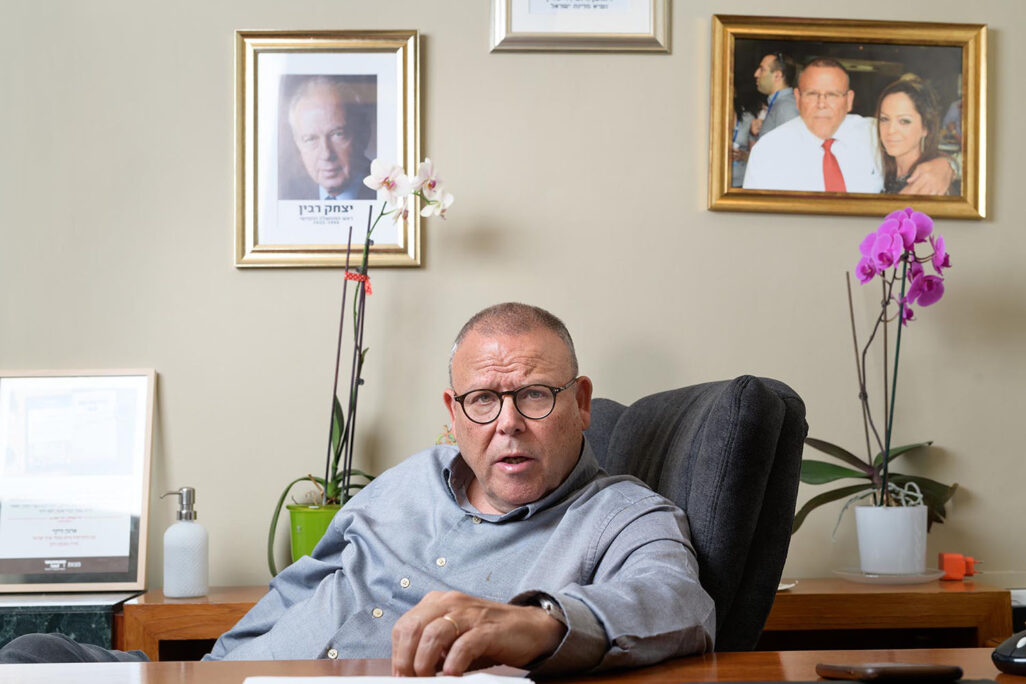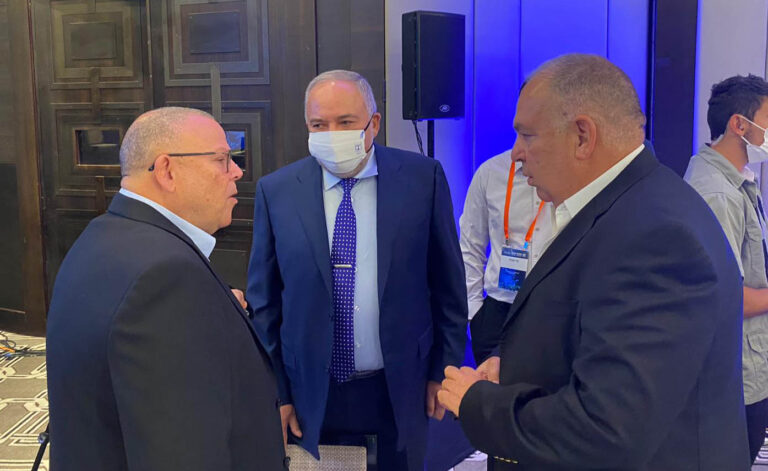
In an interview with Davar in honor of the Jewish New Year, Histadrut chairman Arnon Bar-David shared an optimistic vision for the country’s future, despite the current economic crisis. He expressed his support for the passage of the state budget, despite the complexities embedded in its accompanying Arrangements Law, and expects that an economic “package deal” with improved conditions for workers will soon be signed.
What do you think about the budget and the Arrangements Law that passed in the Knesset?
“First of all, I welcome the fact that there is a budget after three years in which the state has been governed by local decisions and it was impossible to advance anything.
“The Histadrut has succeeded in removing any reform related to workers from the Arrangements Law [so that it will be discussed and passed separately]. I am not satisfied with everything: there are some things that need to be fixed, such as the plan to raise the retirement age for women. Also, I am still not satisfied with the issue of [doing away with the] designated bonds [model of pensions savings].
“But overall, the Histadrut sees itself as part of the Israeli economy, so we welcome the attempt to stabilize and promote the Israel economy. The passage of the budget will provide political stability that has been sorely lacking for the past two and a half years.”
“Good news for the younger generation”
From almost the first moment of the Bennett-Lapid government’s formation, the Histadrut has been working on an economic “package deal,” similar to the economic overhaul that emerged from the 2008 economic crisis. This deal will reflect agreements between employees, workers and the state, and serves as a complementary step to the new budget and the reforms set out in the Arrangements Law. Ram Belnikov, the director general of the Ministry of Finance, has recently suggested that the package deal would include a raised minimum wage and an increased number of vacation days.
Can you reveal some of the aspects of the agreement that the Histadrut has fought for?
“The basis of the package deal negotiations is a wage freeze for 2022, and a few other things on which I can’t elaborate. At the same time, the Histadrut is demanding that the minimum wage be raised to 6,000 shekels [about $1,900] a month [from the current minimum wage of 5,300 shekels, or about $1,700], which is almost closed. This increase will begin gradually in 2021, and will continue for several years to come.
“I think this is great news for the younger generation in the State of Israel. The aim of this news is precisely the workers who aren’t unionized, and the younger generation who are just being discharged from the army. It is a socially-inclined move that before all else, strengthens the weaker sectors of society and the younger workers.
“On the other hand, I'm not happy with the state of affairs over [increasing paid public holidays to include] six long weekends a year. At the moment, we are not able to make progress there. We might add two days off per year per employee [in addition to the 12 to 28 paid days off currently guaranteed to employees, depending on their seniority and days worked per week] because in Israel people work too many hours, and there are too few days off, compared to other countries in the OECD (Organisation for Economic Co-operation and Development).
“Here, too, we’re focusing on lower-level workers. There are a few more aspects to deal with, and it is possible that by the beginning or middle of October we will already have a deal in hand.”
Is there anything the Histadrut will not be willing to compromise on in the package deal?
“Wage reduction for workers. We took it off the table.”
“The workers in aviation and tourism keep me very busy”
Workers in the aviation and tourism industry in Israel have reached a deep unemployment crisis. These branches of employment have not recovered from the economic effects of the pandemic. The safety nets put in place to support unemployed workers have expired, but a widespread return to work in these fields still seems to be out of reach. In the past month, airline employees have physically blocked the runways at Ben Gurion Airport in protest.
“In the midst of the pandemic crisis, we have a whole sector that hasn’t yet bounced back,” Bar-David said. “The workers in aviation and tourism keep me very busy. I deal with this issue day and night, especially the airlines. It really deprives me of sleep. I very much hope the airlines will start to recover. Once they recover, the workers will be able to return to work.”
What are the solutions on the table?
“There is a struggle right now within El Al. Cuts have already been made throughout the pandemic — today, they have 2,000 fewer workers than there were on the eve of the crisis. There is currently no paid leave model for these laid-off workers. We created an internal, local paid leave model, until the end of October, in which the Histadrut gives them some of the money, but it will be finished by the end of October. There are no solutions at the moment. It’s something I can’t solve with the Treasury.”
What will you do?
“It may be that the whole aviation industry will enter as a condition of the package deal. It’s not an option to abandon these workers. We are standing behind them together with the heads of the unions, and especially [El Al union chair] Sharon Ben-Yitzhak, who is leading this struggle. This is after we have already reduced huge numbers of workers. We always have our finger on the pulse. I hope these workers will see better days.”
“When it comes to a safety net for the self-employed, people are all talk and no action”
What are the burning issues right now?
“In recent months, we’ve been dealing with backups at the ports that have been linked to a shortage of workers, and we’ve solved that in the last week. In Ashdod, we’re getting another 80 workers, and we’re also getting more workers in Haifa.
![Bar-David: “[The package deal] strengthens the weaker sectors of society and the younger workers.” (Photo: Jonathan Bloom) Bar-David: “[The package deal] strengthens the weaker sectors of society and the younger workers.” (Photo: Jonathan Bloom)](https://static.davar1.co.il/www/uploads/2021/09/050921_bardavid1-768x512.jpg)
“At the Alpha Group [Israel’s major telecommunications company, formed from a recent merger between Bezeq International, Pelephone, and Yes] there is no mutual trust between the unions and the management there, and the workers have been on strike for several days.
“Together with MK Miki Zohar [of the center-right Likud party], I submitted a bill to create a safety net for self-employed workers. There should soon be a new law that will give a degree of security to the self-employed.
“We are moving forward with the Self-Employment Forum [a sector of the Histadrut that provides services to the self-employed]. When it comes to a safety net for the self-employed, people are all talk and no action. In my opinion, a self-employed person should have a safety net as an employee, up to 10,400 shekels [about $3200], no less. We have seen what happens in a time of crisis. The Treasury is opposed to it at the moment. This very morning I had conversations with them on the subject. Maybe that will also be part of the package deal.
“The main good news for the self-employed is that they have a home. They come to the Histadrut office and say, ‘we feel at home.’ Once, they would pass the offices of the Histadrut and curse, and today they feel at home here. This is where it starts. This is part of the change in the conversation that I have been leading since I took over as chairman of the Histadrut.”
“The Histadrut is much more accessible than before”
Bar-David has served as chairman of the Histadrut for almost two and a half years. His tenure is largely characterized so far by negotiating responses to the pandemic (public sector agreements and flexibility in working from home, among others) alongside major reforms in the ports and the Israel Electric Corporation. He divides his work into three parts — political, professional, and member-oriented — and examines the progress of the Histadrut along these axes.

“We are trying to act on several levels, with the first level being political,” he explained. “The Histadrut operates in all political parties. Gone are the days of the Histadrut having one party and one party having the Histadrut (the Labor Party). We provide extensive protection to workers in the State of Israel. There are currently no legislative threats in the Knesset.
“At the professional level, we are in a constant struggle. I sign hundreds of collective agreements a year. The heads of the unions and of the Histadrut offices and departments are all very busy on the ground, in all the factories from Dan to Eilat. I think the Histadrut is much more accessible than before.
“The third tier is of the service to the members and the image of the Histadrut. Today, Histadrut members enjoy our activities, our new products, the benefits club, the courses, and even receive our newspaper.
“I’m constantly evaluating the Histadrut on these three levels. Are we moving forward? Are we successfully improving? I hope that we will continue to improve this year as well, and we will be even better.”
Are there already preparations for the next Histadrut elections?
“The Histadrut is ready for the elections. As far as the Election Commission is concerned, a great deal of work has already been done. We’re working according to the schedules that they set. This year’s elections will be computerized. An hour and a half after the polls close, there will already be results. We will be the largest organization in the State of Israel where the elections are computerized and not on paper ballots.”
The period around Rosh Hashanah is a time for soul-searching and setting new intentions. What is one decision you regret, and what are you hoping for in the new year?
“I made a lot of decisions this year. I think they were good decisions. In this role, you have to make decisions all the time. We affect hundreds of thousands of families in Israel. Ultimately, there were decisions related to individuals. I am a person who believes in people, and sometimes I end up disappointed.
“If I look ahead, my wish is that the Histadrut will continue to be a serious institution, connected to the State of Israel, and a leader in the field. That the change I am leading here will continue to develop, and will be relevant for another 100 years. This is one of the main tasks I took on when I entered, and I hope we progress toward it. I'm very optimistic about the path we are taking.”






